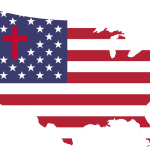There are a number of things in the Bible that should trouble any reader. We find in its pages things like genocide, gang rape, and slavery — not only being sanctioned, but at times even being commanded. For example we read in the law of Moses the divine command for God’s people to “show them no mercy” (Deuteronomy 7:2) and to “kill everything that breathes” (Deuteronomy 20:16).
That’s not the whole story though. Alongside these troubling texts, we also find many passages in the Bible affirming a message of compassion and care for the poor and the stranger. In short, we find both wonderful things and horrible things in the Bible.
The fact is, the Bible is multi-vocal. It does not contain one single correct position, but a multitude of conflicting visions of what justice and goodness mean. In some places we find hatred and killing presented as God’s will, and in other places we find a counter-argument proclaiming grace, mercy, and love as God’s way.
Each side is presented as being the correct position, presented as speaking for God, but with opposite and contradictory views of what God’s will is. The Bible is a record of dispute, a catalog of opposing arguments. Old Testament scholar Walter Brueggemann calls this “witness and counter-witness,” evoking the image of two opposing sides in a courtroom, each making their case.
This might lead us to ask,
“Why would God allow for immoral things like genocide or slavery to be portrayed in the Bible as God’s will if they are not? Why are these books part of our canon?”
To understand this, it is important to begin with what the Bible is. We might wish that the Bible was a book that would tell us the right answer to moral questions, so we could open it up and find out what God’s will is. I wish it was. But as reasonable and noble as that desire may be, the Bible is simply not that kind of book.
Read the rest here















